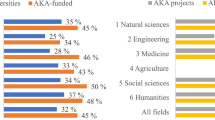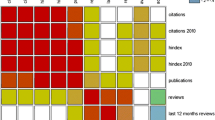Abstract
This study analyzed whether the number and influence of academic papers published by East Asian researchers affect the peer review and editing activities of international academic journals. Data from Web of Science Researcher Profiles of 506 active East Asian reviewers on article publications, peer reviews, and editorial contributions were subjected to regression and moderating effect analyses. The results showed that research productivity had a weak effect on the number of peer reviews and editorial contributions; thus, scholars who produce many papers do not necessarily review many international journals (β = 0.325, p < 0.01). In addition, the academic performance of East Asian reviewers did not show a positive (+) moderating effect in the pathway in which the amount of review affects the editorial contribution. Effort to induce contributions from highly productive and influential Asian researchers to the editing of international journals is needed.
Similar content being viewed by others
Data availability
Data will be made available on request.
References
Aczel, B., Szaszi, B., & Holcombe, A. O. (2021). A billion-dollar donation: Estimating the cost of researchers’ time spent on peer review. Research Integrity and Peer Review, 6, 14. https://doi.org/10.1186/s41073-021-00118-2
Ahmed, S., & Anirvan, P. (2021). Top central Asian educational institutions on Publons: Analysis of researchers and reviewers. Journal of Korean Medical Science, 36(21), e144. https://doi.org/10.3346/jkms.2021.36.e144
Akça, S., & Şenyurt, Ö. (2023). Geographical representation of editorial boards: A review in the field of library and information sciences. Scientometrics, 128, 1409–1427. https://doi.org/10.1007/s11192-022-04614-0
Cabanac, G. (2012). Shaping the landscape of research in information systems from the perspective of editorial boards: A scientometric study of 77 leading journals. Journal of the American Society for Information Science and Technology, 63(5), 977–996. https://doi.org/10.1002/asi.22609
Callaham, M. L., & Tercier, J. (2007). The relationship of previous training and experience of journal peer reviewers to subsequent review quality. PLOS Medicine, 4(1), e40. https://doi.org/10.1371/journal.pmed.0040040
Callaham, M. L., Wears, R. L., & Waeckerle, J. F. (1998). Effect of attendance at a training session on peer reviewer quality and performance. Annals of Emergency Medicine, 32(3), 318–322.
Cho, J. (2022). A study on the peer review activity of domestic researchers in international journals: Focused on Publons. Journal of the Korean Biblia Society for Library and Information Science, 33(1), 5–24. https://doi.org/10.14699/kbiblia.2022.33.1.005
Chong, S. W. (2021). Improving peer-review by developing reviewers’ feedback literacy. Learned Publishing, 34(3), 461–467. https://doi.org/10.1002/leap.1378
Clarivate (2018). It’s not the size that matters. Available: https://clarivate.com/blog/its-not-the-size-that-matters
Clarivate (2019). Global Peer Review Awards. https://publons.com/wos-op/awards/peer-review/2019/excellent-reviews/. Accessed May 1 2023
Clarivate (2022). What are editor records and who can add them? Retrieved May 1, 2023, from https://publons.freshdesk.com/support/solutions/articles/12000089396-what-are-editor-records-and-who-can-add-them-
Clarivate. (2023). Incite. https://clarivate.com/. Accessed May 1 2023
Ernst, N. A., Carver, J. C., Mendez, D., & Torchiano, M. (2021). Understanding peer review of software engineering papers. Empirical Software Engineering. https://doi.org/10.1007/s10664-021-10005-5
Espin, J., Palmas, S., Carrasco-Rueda, F., Riemer, K., Allen, P. E., Berkebile, N., Hecht, K. A., Kastner-Wilcox, K., Núñez-Regueiro, M. M., Prince, C., Rios, C., Ross, E., Sangha, B., Tyler, T., Ungvari-Martin, J., Villegas, M., Cataldo, T. T., & Bruna, E. M. (2017). A persistent lack of international representation on editorial boards in environmental biology. PLoS Biology, 15(12), e2002760. https://doi.org/10.1371/journal.pbio.2002760
Garcia, J. A., Rodriguez-Sánchez, R., & Fdez-Valdivia, J. (2021). The editor-manuscript game. Scientometrics, 126(5), 4277–4295. https://doi.org/10.1007/s11192-021-03918-x
Gasparyan, A. Y., & Kitas, G. D. (2012). Best peer reviewers and the quality of peer review in biomedical journals. Croatian Medical Journal, 53(4), 386–389.
Glonti, K., Boutron, I., Moher, D., & Hren, D. (2019). Journal editors’ perspectives on the roles and tasks of peer reviewers in biomedical journals: A qualitative study. British Medical Journal Open, 9(11), e033421. https://doi.org/10.1136/bmjopen-2019-033421
Goyanes, M., & Demeter, M. (2020). How the geographic diversity of editorial boards affects what is published in JCR-ranked communication journals. Journalism & Mass Communication Quarterly, 97(4), 1123–1148. https://doi.org/10.1177/1077699020904169
Harper R. (2020). Peer review motivations report 2020. IOP. Retrieved May 1, 2023, from https://ioppublishing.org/news/iop‐publishing‐report‐reveals‐continued‐global‐imbalance‐in‐distribution‐of‐peer‐review/
Harzing, A.-W. (2020). How to avoid a desk-reject in seven steps [1/8]. Retrieved May 1, 2023, from https://harzing.com/blog/2020/05/how-to-avoid-a-desk-reject-in-seven-steps
Harzing, A. W., & Metz, I. (2013). Practicing what we preach. Management International Review, 53, 169–187. https://doi.org/10.1007/s11575-011-0124-x
Hayes, A. F. (2017). Introduction to mediation, moderation, and conditional process analysis: A regression-based approach (2nd ed.). New York: Guilford Press.
Koçyiğit, B. F., & Akyol, A. (2021). Publons based profiling of Turkish reviewers and academic institutions. Central Asian Journal of Medical Hypotheses and Ethics, 2(4), 198–208. https://doi.org/10.47316/cajmhe.2021.2.4.03
Kovanis, M., Porcher, R., Ravaud, P., & Trinquart, L. (2016). The global burden of journal peer review in the biomedical literature: Strong imbalance in the collective enterprise. PLoS ONE, 11(11), e0166387. https://doi.org/10.1371/journal.pone.0166387
Lowe, D. J., & van Fleet, D. (2009). Scholarly achievement and accounting journal editorial board membership. Journal of Accounting Education, 27(4), 197–209. https://doi.org/10.1016/j.jaccedu.2010.07.004
Ortega, J. L. (2017). Are peer-review activities related to reviewer bibliometric performance? A scientometric analysis of Publons. Scientometrics, 112, 947–962. https://doi.org/10.1007/s11192-017-2399-6
Stremersch, S., & Verhoef, P. C. (2005). Globalization of authorship in the marketing discipline: Does it help or hinder the field? Marketing Science, 24(4), 585–594. https://doi.org/10.1287/mksc.1050.0152
Teixeira da Silva, J. A., & Nazarovets, S. (2022). The role of Publons in the context of open peer review. Publishing Research Quarterly, 38, 760–781. https://doi.org/10.1007/s12109-022-09914-0
Walters, W. (2016). The research contributions of editorial board members in library and information science. Journal of Scholarly Publishing, 47(2), 121–146. https://doi.org/10.3138/jsp.47.2.121
Weinrach, S. G., Thomas, K. R., Pruett, S. R., & Chan, F. (2006). Scholarly productivity of editorial board members of three American counseling and counseling psychology journals. International Journal for the Advancement of Counselling, 28(3), 303–315. https://doi.org/10.1007/s10447-005-9009-7
Willett, P. (2013). The characteristics of journal editorial boards in library and information science. International Journal of Knowledge Content Development & Technology, 3(1), 5–18.
Yip, S. W., & Rashid, M. A. (2021). Editorial diversity in medical education journals. The Clinical Teacher, 18, 523–528. https://doi.org/10.1111/tct.13386
Zhang, L., Shang, Y., Huang, Y., & Sivertsen, G. (2022). Gender differences among active reviewers: An investigation based on Publons. Scientometrics, 127, 145–179. https://doi.org/10.1007/s11192-021-04209-1
Zsindely, S., Schubert, A., & Braun, T. (1982). Citation patterns of editorial gatekeepers in international chemistry journals. Scientometrics, 4, 69–76. https://doi.org/10.1007/BF02098007
Author information
Authors and Affiliations
Corresponding author
Ethics declarations
Competing interests
The authors declare that they have no known competing financial interests or personal relationships that could have appeared to influence the work reported in this paper.
Additional information
Publisher's Note
Springer Nature remains neutral with regard to jurisdictional claims in published maps and institutional affiliations.
Rights and permissions
Springer Nature or its licensor (e.g. a society or other partner) holds exclusive rights to this article under a publishing agreement with the author(s) or other rightsholder(s); author self-archiving of the accepted manuscript version of this article is solely governed by the terms of such publishing agreement and applicable law.
About this article
Cite this article
Cho, J. The effect East Asian researcher’s academic performance on international journal review and editing activities. Scientometrics 129, 1825–1839 (2024). https://doi.org/10.1007/s11192-023-04918-9
Received:
Accepted:
Published:
Issue Date:
DOI: https://doi.org/10.1007/s11192-023-04918-9




